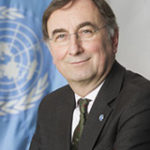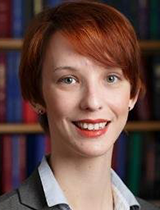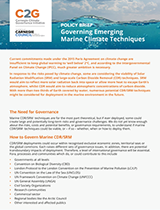C2GDiscuss
Ocean-based climate altering approaches in context: the ocean-climate nexus
8 June 2021, 8:00 AM UTC
This interview was recorded on 1 June 2021, and is also available with interpretation into 中文, Español and Français.
The oceans and climate change are inextricably connected. On the one hand, the oceans are faced with significant threats posed by climate change through acidification, loss of oxygen, and warming; on the other hand, the oceans play a critical role in regulating the climate system, acting as a major heat and carbon sink, and have been increasingly regarded as a source of solutions to climate change.
A range of additional ocean-based climate-altering approaches are being explored to limit climate impacts. For example, introducing additional nutrients to enhance photosynthesis of plankton to remove CO2 from the ocean surface and transport it to the deep ocean; cultivating large-scale seaweed to capture carbon through photosynthesis for sequestration; and brightening marine clouds through spraying sea water to deliver cooling locally.
However, all these approaches may present potential benefits and risks. What do the ocean protection community and the climate protection community say about these approaches? Is there a panacea for addressing the major environmental and socio-political challenges that these approaches pose? How can their risks and benefits be weighed up against the expected impacts of climate change?
For World Oceans Day 2021, C2GDiscuss features three global experts sharing their views on “Ocean-based climate-altering approaches in context: the ocean-climate nexus“.
Speakers:
Kristina M. Gjerde, International Union for Conservation (IUCN)

To advance science-based progress, Kristina co-founded and currently serves on the boards of four initiatives: Deep Ocean Stewardship Initiative (DOSI), a multidisciplinary scientific partnership, Global Ocean Biodiversity Initiative, Sargasso Sea Project and the High Seas Alliance. Kristina is also a member of the Interim Advisory Board of the UN Decade of Ocean Science, an advisor to the Schmidt Ocean Institute and the iAtlantic project, and an honorary fellow of the School of Geosciences at the University of Edinburgh.
Kristina received her Juris Doctor from New York University School of Law with a focus on comparative and international law, and practiced admiralty law for several years in a New York City law firm. She currently lives in Cambridge, Massachusetts.
Joyashree Roy, Asian Institute of Technology

She has been one of two coordinating Lead Authors of the Chapter 7 of the Inter-Governmental Panel on Climate Change’s (IPCC), AR4, WGIII on “Climate Change 2007: Mitigation of Climate Change”. She is also part of the IPCC Fifth and Sixth assessment cycles and was in the Land Ocean Interactions of the Coastal Zone (LOICZ) steering committee. In 2019 she was one of the co-authors of the report ‘The Ocean as a Solution to Climate Change: Five Opportunities for Action.’ of World Resources Institute.
She was involved in the preparation of the Stern Review Report, Global Energy Assessment and many other national and global efforts. In her independent research capacity, she has authored books and written 137 articles in leading peer reviewed, professional journals and books.
Stefanos Fotiou, United Nations Economic and Social Commission for Asia and the Pacific

Highlights of his work in his current post include successfully leading intergovernmental negotiations resulting in specific normative outcomes, establishing new initiatives on technical cooperation and capacity development as well as ideating and steering analytical work in the substantive areas of his responsibility. Prior to this Stefanos worked for 10 years in the UN Environment Programme in various roles in the Economy Division and in the Asia-Pacific office.
Throughout his career, Stefanos has taken leading roles in international forums, has conceptualised and led the development of regional and national strategies on environment and sustainable development and his work has been published and referenced. He holds a PhD in Natural Resource Economics, a Master of Science in Information Systems, and a Master of Science in Forestry and Natural Environment.
Moderator:
Janos Pasztor, Carnegie Climate Governance Initiative

Earlier, he was Acting Executive Director for Conservation (2014), and Policy and Science Director (2012-2014), at WWF International. He directed the UNSG’s Climate Change Support Team (2008-2010) and later was Executive Secretary of the UNSG’s High-level Panel on Global Sustainability (2010-2012). In 2007 he directed the Geneva-based UN Environment Management Group (EMG). During 1993-2006 he worked and over time held many responsibilities at the Climate Change Secretariat (UNFCCC), initially in Geneva and later in Bonn.
His other assignments included: the Secretariat of the UN Conference on Environment and Development (Earth Summit ’92); Stockholm Environment Institute; United Nations Environment Programme (UNEP); Secretariat of the World Commission on Environment and Development (Brundtland Commission); the Beijer Institute; and the World Council of Churches. He has BSc and MSc degrees from the Massachusetts Institute of Technology (MIT).
Highlights:
“Can existing international fora address the governance of ocean-based climate-altering approaches?”
Stefanos Fotiou
Director of the Environment and Development Division, United Nations Economic and Social Commission for Asia and the Pacific
“Is traditional mitigation enough to protect the oceans?”
Joyashree Roy
Inaugural Bangabandhu Chair Professor, Asian Institute of Technology (AIT)
“How can ocean and climate science be better heard in international ocean policy negotiations?”
Kristina M. Gjerde
Senior High Seas Advisor, International Union for Conservation of Nature (IUCN’s) Global Marine and Polar Programme & Adjunct Professor, Middlebury Institute of International Studies at Monterey, California
“How might carbon dioxide removal approaches affect the ocean?”
Stefanos Fotiou
Director of the Environment and Development Division, United Nations Economic and Social Commission for Asia and the Pacific
“Is more research needed to assess the impacts of ocean-based climate-altering approaches?”
Joyashree Roy
Inaugural Bangabandhu Chair Professor, Asian Institute of Technology (AIT)
“How might the UN Law of the Sea (UNCLOS) help govern ocean-based climate-altering approaches?”
Kristina M. Gjerde
Senior High Seas Advisor, International Union for Conservation of Nature (IUCN’s) Global Marine and Polar Programme & Adjunct Professor, Middlebury Institute of International Studies at Monterey, California
Related posts:
Putting the Great Barrier Reef marine cloud brightening experiment into context
Guest post by Kerryn Brent, Jeffrey McGee, Jan McDonald, and Manon Simon.


